Why Health and Fitness Companies Must Embrace Automation
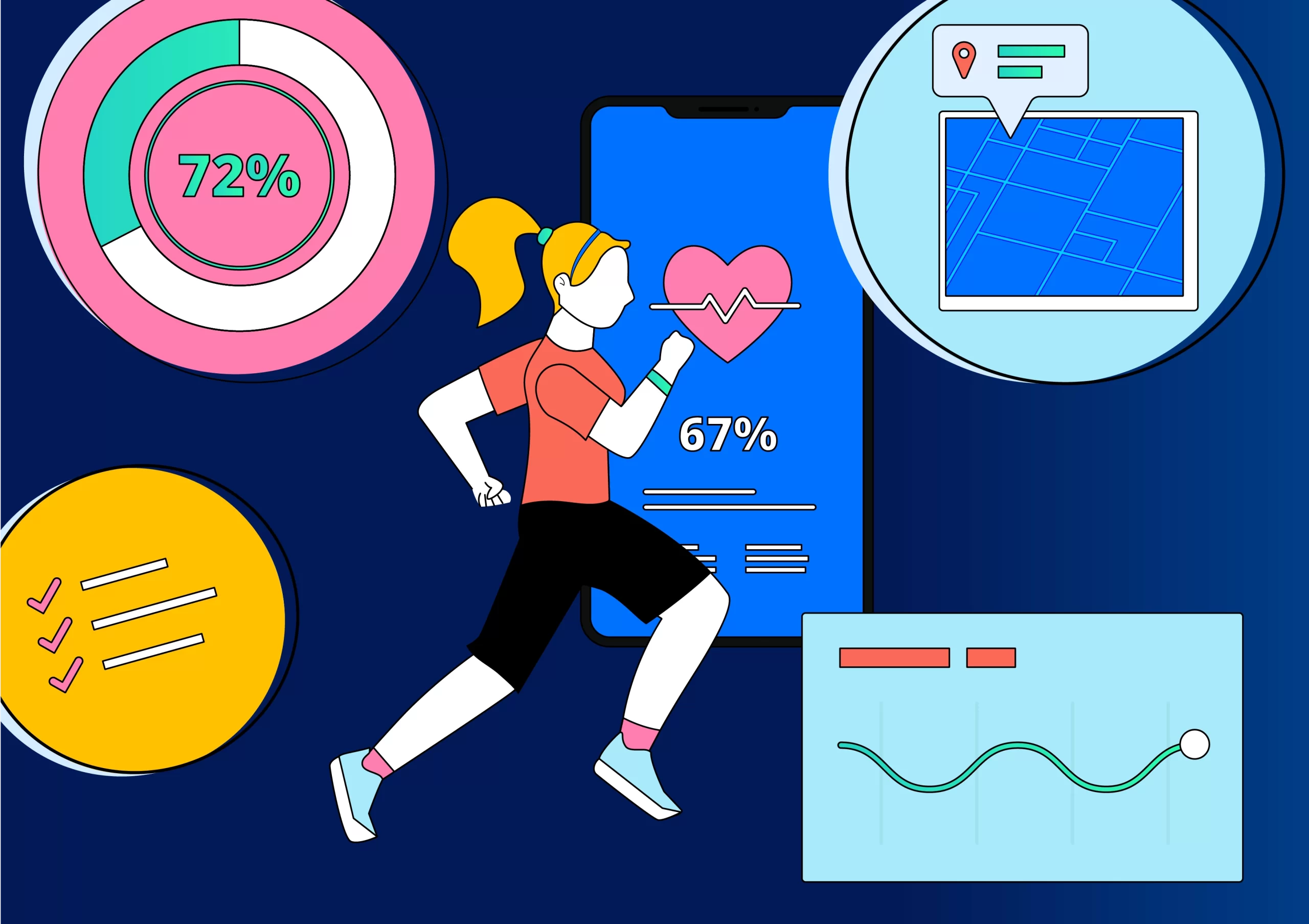
With a global emphasis on well-being and a heightened awareness of the importance of a healthy lifestyle, this industry has expanded rapidly, embracing new trends, technologies, and consumer demands.
Amidst this growth, the need for automation in health and fitness and efficient business processes has never been more crucial. Streamlined operations enable health and fitness companies to meet the escalating demands of their clientele but also position them competitively in the market.
This article explores the reasons to automate your health and fitness business and introduces the transformative potential of automation in revolutionizing how these businesses operate.
Table of contents
- Automating Health and Fitness: Key Motives for Integration
- Areas of Fitness and Healthcare Businesses That Can Benefit From Automation
- Alternative-spaces is Your Automation & Booking System Development Partner
- Summing Up
- FAQ
Automating Health and Fitness: Key Motives for Integration
Integrating automation within the health and fitness industry is a transformative stride towards a more efficient and effective operational landscape. There are several key benefits of automation in your health and fitness business:
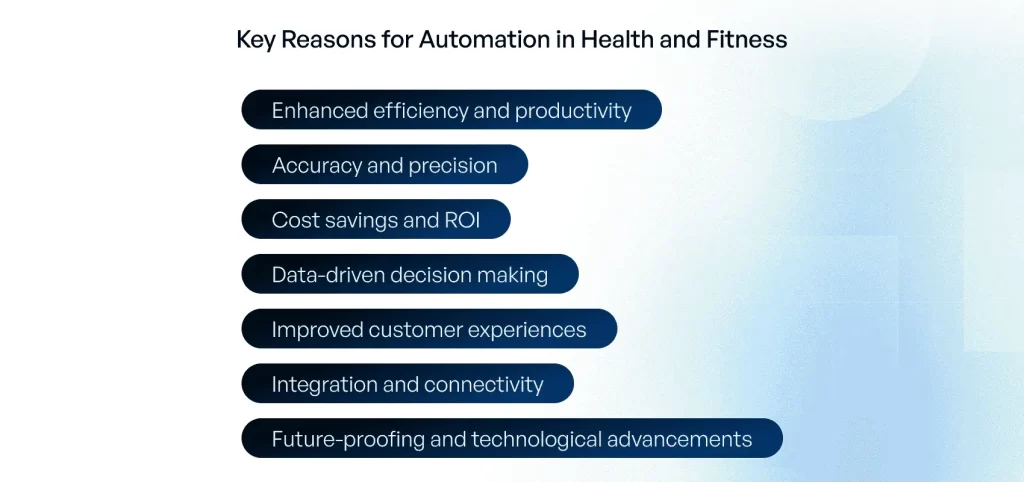
Enhanced efficiency and productivity
In a survey, 92% of healthcare professionals acknowledged that excessive time spent on administrative tasks significantly adds to burnout. Automation in health and fitness amplifies efficiency and productivity by streamlining appointment scheduling, billing, fitness tracking, and nutrition planning.
Moreover, automation reduces manual labor, minimizes errors, enhances customer engagement, provides personalized experiences, and optimizes resource management, ultimately leading to a more effective and productive operation within the industry.
Accuracy and precision
According to the National Center for Biotechnology Information research, approximately 400,000 hospital patients undergo preventable harm yearly. The financial impact of these medical errors ranges between $4 billion and $20 billion annually.
Automation in health and fitness ensures accuracy and precision by leveraging technology to collect and process data consistently. This eliminates human error, enabling precise measurement of health metrics, personalized workout plans, and nutrition guidance. Automated systems provide reliable and consistent results, improving the overall quality and effectiveness of health and fitness services.
Read also: What it Takes to Make a Custom Fitness App: 2023 Complete Guide
Cost savings and ROI
Automation reduces labor costs by minimizing the need for manual intervention in routine tasks. It efficiently manages appointments, billing, and facility maintenance by lowering operational costs.
Additionally, automation enhances productivity, allowing businesses to serve more clients without proportionally increasing expenses, ultimately leading to a favorable ROI.
Data-driven decision-making
Automation provides access to accurate and real-time data. This data encompasses user behaviors, preferences, workout routines, health metrics, and more. Automated systems process this data to generate valuable insights and trends, empowering businesses to make informed decisions, optimize services, tailor offerings to specific demographics, and improve overall customer satisfaction.
Improved customer experiences
Automation in the fitness business and health industry significantly enhances customer experiences by providing streamlined and personalized services. Automated appointment scheduling, reminders, and tailored workout or nutrition plans cater to individual preferences and goals, creating a more personalized journey.
Additionally, automated feedback mechanisms allow businesses to quickly address concerns and continuously improve services, resulting in higher customer satisfaction and loyalty.
Integration and connectivity
Automation facilitates seamless integration of various systems and processes within the health and fitness ecosystem. This integration ensures smooth communication between wearables, fitness apps, scheduling tools, and payment systems. As a result, users can effortlessly track their fitness progress, schedule appointments, make payments, and access comprehensive health information, creating a unified and connected experience in the health and fitness ecosystem.
Regulatory compliance
Adhering to regulatory standards is vital for healthcare organizations, including HIPAA compliance, a crucial regulation safeguarding patients’ medical data. Violations of HIPAA can result in penalties ranging from $100 to $100,000 per breach.
Intelligent bots play a vital role in assisting healthcare providers to achieve and maintain compliance. They automate the logging of actions, meticulously track and document activity logs, enhance transparency, and aid in compliance efforts.
Moreover, these intelligent bots can foresee potential fraudulent activities and act as a preventive measure against intentional or accidental data breaches.
Future-proofing and technological advancements
Automated systems can readily integrate emerging technologies like AI, machine learning, virtual reality, or genomics, enhancing the quality of services, personalized recommendations, and precision in health and fitness offerings. This future-focused approach ensures that the industry remains relevant and competitive as technologies evolve.
Areas of Fitness and Healthcare Businesses That Can Benefit From Automation
Automation has immense potential for revolutionizing various critical areas within fitness and healthcare businesses.
The global healthcare automation market size was estimated at USD 35.2 billion in 2022 and is expected to reach USD 90.88 billion by 2032, registering a CAGR of 10.00% from 2023 to 2032.
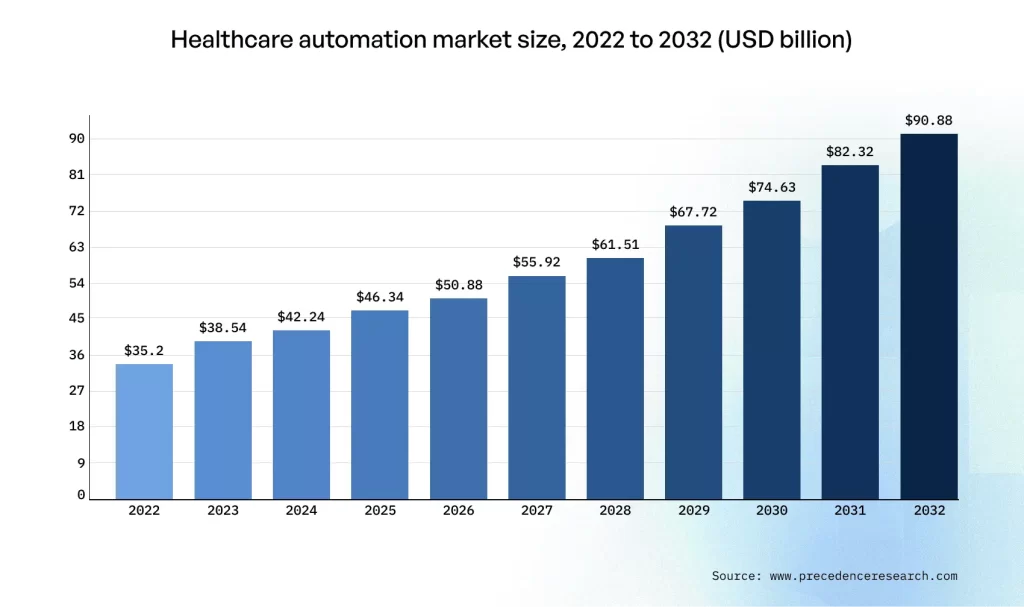
Below, we highlight specific areas where automation can bring significant advantages:
Patient/client onboarding and data management
Automated processes streamline the onboarding experience, making it efficient and user-friendly for patients or clients to join fitness programs or healthcare services. Additionally, automation ensures secure and organized data management, reducing paperwork and centralizing essential information for better accessibility, analysis, and decision-making, ultimately improving overall operational efficiency.
Advantages:
- Faster onboarding processes, leading to quicker service initiation.
- Enhanced data accuracy and security through automated data validation.
- Better compliance with data privacy regulations.
Read also: What Fitness Tech Trends Will Emerge in the Coming Years
Appointment scheduling and reminders
Automating appointment scheduling and reminders is a key area for both fitness and healthcare businesses. It optimizes the allocation of resources and reduces no-shows, improving overall operational efficiency.
Advantages:
- 24/7 availability for appointment scheduling, catering to varying client/patient schedules.
- Real-time updates and reminders, reducing no-shows and improving appointment adherence.
- Efficient allocation of staff and resources based on scheduled appointments.
For example, the Alternative-spaces team developed a scheduler for medical doctors and clinic administrators. This app assists doctors in efficiently managing their schedules, optimizing travel for house calls, and accessing pertinent medical information about each patient during the visit. The application streamlines doctor-patient interactions during house calls, improving healthcare delivery.
Billing and invoicing
Automation in billing and invoicing processes brings efficiency and accuracy, ensuring timely and transparent financial transactions. It simplifies the generation of invoices, tracks payments, and manages financial records.
Advantages:
- Accurate and consistent invoices, minimizing errors and disputes.
- Faster billing cycles lead to improved cash flow.
- Integration with payment systems for seamless and timely transactions.
For example, DrChrono is a comprehensive healthcare platform renowned for its robust billing functionality. It offers healthcare providers a seamless and efficient way to manage medical billing processes. The software simplifies billing workflows, streamlines charge capture, automates claims submission, tracks reimbursements, and ensures compliance with billing regulations. DrChrono’s billing features help healthcare practices maximize revenue and improve financial management.
Health records and documentation
Automation in managing health records and other clinical documentation can significantly improve workflow and data accessibility. Electronic Health Record (EHR) systems automate data entry, retrieval, and sharing, enhancing patient care.
Advantages:
- Centralized, easily accessible health records for authorized healthcare professionals.
- Efficient data updates and sharing, promoting collaboration and informed decision-making.
- Improved patient care and safety through comprehensive and up-to-date health records.
For example, Practice Fusion is a cloud-based EHR system and healthcare practice management software. It aimed to provide a user-friendly and accessible platform for medical professionals, enabling them to manage patient records, schedule appointments, e-prescribe medications, and facilitate billing processes.
Key features of Practice Fusion included electronic charting, customizable templates for various medical specialties, integrated e-prescribing, lab integrations, patient portals for secure communication, appointment scheduling, and billing capabilities. It was designed to streamline clinical workflows, enhance patient engagement, and improve overall practice efficiency.
Inventory and supply chain management
In healthcare, efficient management of supplies and medications is crucial for uninterrupted operations. Automation in inventory management optimizes stock levels, tracks expiration dates, and ensures the availability of essential supplies.
Advantages:
- Optimal stock levels, reducing excess or inadequate inventory.
- Timely restocking to prevent shortages and maintain seamless operations.
- Cost-efficiency through better management of supply chains.
For example, Hybrent is a cloud-based supply chain management software designed for healthcare organizations and medical facilities. It streamlines procurement, inventory management, and accounts payable processes. The platform enables efficient medical supplies and inventory management, automating ordering, tracking, and reordering to optimize inventory levels and reduce costs.
Marketing and customer engagement
Automation tools can streamline marketing efforts, including email campaigns, social media management, and customer communication.
Sending repetitive daily emails can lead to customer disengagement. Automation allows you to send tailored emails to targeted potential clients when the timing is optimal. This ensures a consistent and targeted approach to engaging clients or patients.
Moreover, tailoring your emails leads to a 14 percent boost in open rates and a 10 percent increase in conversions.
Advantages:
- Targeted marketing strategies for specific customer segments.
- Personalized communication and engagement, improving customer satisfaction and loyalty.
- Efficient management of marketing campaigns and analytics for data-driven decisions.
For example, Mailchimp is a platform that automates email marketing for various businesses, including healthcare. It allows healthcare providers to schedule and personalize email campaigns to engage with patients and clients effectively. Mailchimp provides a user-friendly interface and various tools for creating email newsletters, automated messages, and targeted ad campaigns.
Key features of Mailchimp include email creation with customizable templates, audience segmentation, marketing automation, A/B testing, analytics and reporting, social media ad management, landing page creation, and integration with various third-party applications and e-commerce platforms.
Alternative-spaces is Your Automation & Booking System Development Partner
The Alternative-spaces team brings a wealth of experience and a proven track record in crafting bespoke automation and booking systems tailored to your needs. With a deep understanding of the evolving tech landscape, we leverage state-of-the-art tools and methodologies to conceptualize, design, and develop robust and intuitive booking systems.
From seamless appointment scheduling to optimizing resource management, our solutions streamline operations and enhance the end-user experience.
Recently, we showcased our expertise by developing an application that revolutionized request registration within a medical support center.
Our goal was to facilitate the registration form, simplifying the request-gathering process. Salesforce forms, by default, present extensive lists of fields without the ability to be conditionally hidden. To address this, our team engineered a registration form that dynamically displays only the pertinent fields based on the selected request type. For instance, upon choosing “Provider” as the request type, the form exclusively exhibits the necessary fields for completing a request of that type. Subsequently, the request gets logged into the system, enabling users to engage with each specific request efficiently.
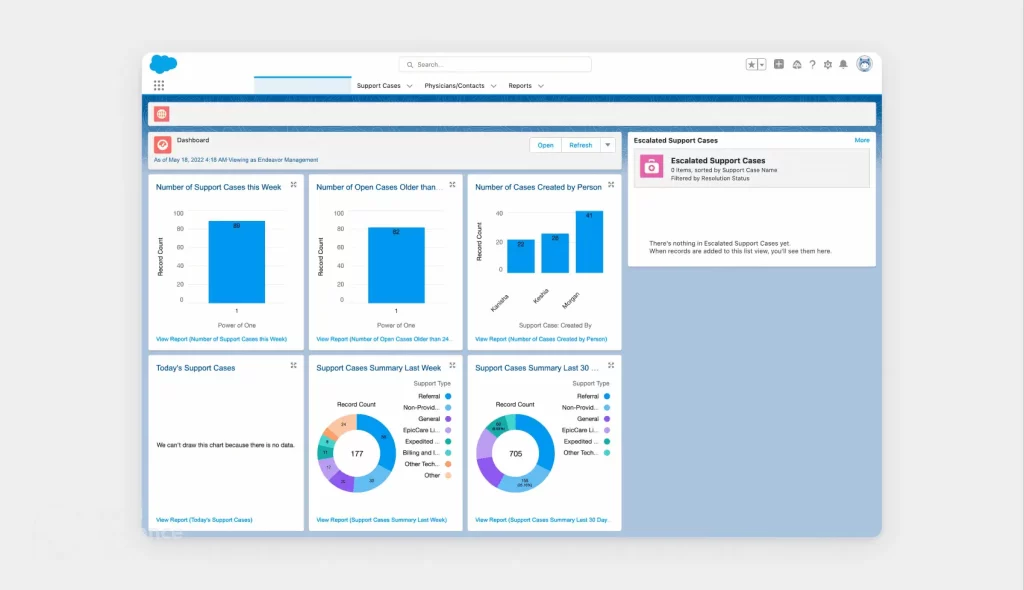
The solution significantly improved productivity, reduced manual efforts, and provided a more intuitive and user-friendly experience for the support staff, ultimately optimizing the request management process within the medical center.
By collaborating with Alternative-spaces, you gain a technology partner and a dedicated team committed to delivering innovative, scalable, and future-proof solutions that transform your business operations.
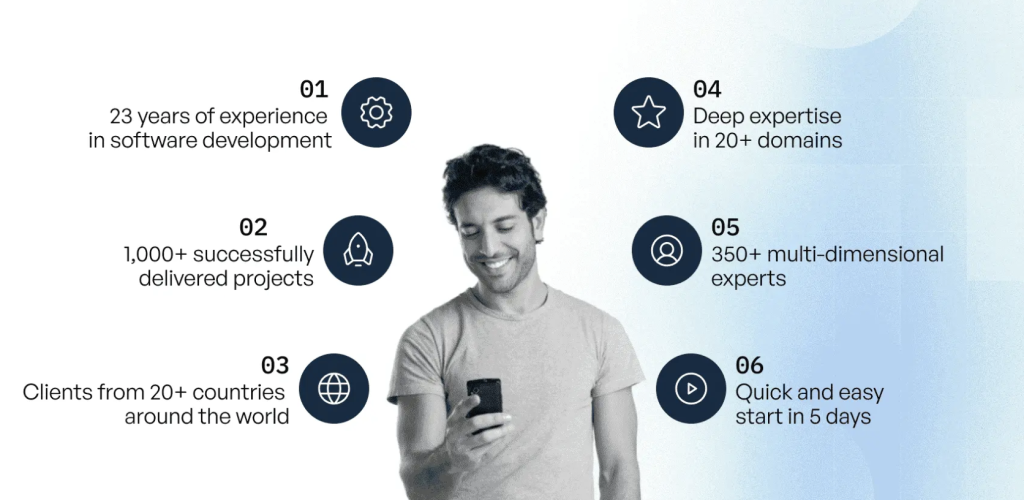
Summing Up
In this rapidly evolving landscape, automation emerges as a beacon of progress, offering multifaceted benefits to health and fitness businesses and their clientele. As we have explored, automation revolutionizes critical aspects of these industries, including appointment scheduling, billing and invoicing, electronic health records, telehealth, inventory management, and customer engagement. The advantages are palpable, from increased efficiency and accuracy to improved customer experiences and cost-effectiveness.
In conclusion, the case for automation in the health and fitness industry is compelling and multifaceted. It propels businesses towards a future marked by streamlined operations, improved services, and increased competitiveness. The opportunities presented by automation are vast, and the time to embrace this transformative force is now. As health and fitness companies embark on this journey, integrating automation into their core processes, they pave the way for a future where efficiency, accuracy, and superior customer experiences define success.
FAQ
How can automation benefit appointment scheduling and management in health and fitness businesses?
Automation in appointment scheduling allows clients to book and manage appointments online, improving accessibility and reducing administrative workload. Real-time availability updates and automated reminders help in efficient appointment management and reduce no-shows.
In what ways does automation enhance billing and invoicing processes?
Automation in billing and invoicing ensures accuracy and consistency in financial transactions. It enables timely generation and distribution of invoices, integration with payment systems, and efficient tracking of payments, ultimately improving cash flow and financial stability.
Is automation scalable for businesses of different sizes within the health and fitness industry?
Yes, automation is highly scalable and adaptable for businesses of varying sizes within the health and fitness industry. Whether it’s a small boutique fitness studio, a medium-sized gym, or a large healthcare facility, automation solutions can be customized to meet each business’s specific needs, workflow, and scale. The versatility of automation tools allows businesses to optimize operations, improve efficiency, and enhance customer experiences regardless of size and scope. It offers the flexibility to start with basic automation processes and gradually expand and integrate more sophisticated automation solutions as the business grows.
How can health and fitness companies get started with implementing automation?
Getting started with automation involves identifying specific areas that need optimization, selecting suitable automation tools or software, training staff, and gradually integrating automation into the workflow. It’s essential to assess business needs and choose automation solutions that align with those needs for a successful transition. If you need help, please contact us.
Is automation secure and reliable for managing sensitive client/patient data?
Yes, automation can be secure and reliable for managing sensitive client/patient data when implemented correctly with robust security measures. Encryption, access controls, compliance with data privacy regulations (e.g., HIPAA, GDPR), regular security audits, and employee training are essential components to ensure the security and reliability of automation in handling sensitive data. By following best practices and industry standards, businesses can maintain the confidentiality, integrity, and availability of sensitive information while leveraging automation to streamline operations and improve efficiency.
Content created by our partner, Onix-systems.
Source: https://onix-systems.com/blog/automation-in-health-and-fitness Home
Home